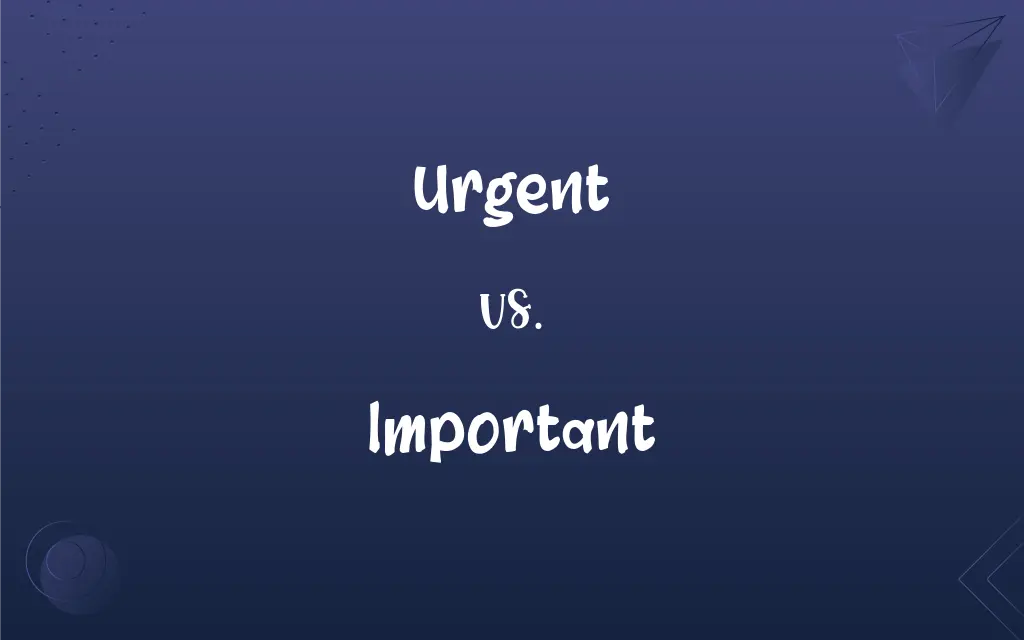Urgent vs. Important: What's the Difference?
Edited by Aimie Carlson || By Janet White || Published on December 4, 2023
"Urgent" refers to something needing immediate attention or action, while "important" denotes something of great significance or value but not necessarily requiring immediate action.

Key Differences
"Urgent" implies a sense of immediacy and necessity for prompt action. For example, an urgent message demands quick attention. "Important," on the other hand, refers to something of great significance or high priority, which may not require immediate action but is crucial in the long term, like an important decision.
The term "urgent" often conveys a time-sensitive nature, suggesting that a delay could lead to adverse consequences. An urgent call, for instance, cannot be postponed without potential risks. In contrast, "important" signifies value or relevance to a particular context or overall goals, such as an important principle, which remains significant regardless of time.
In a work context, "urgent" tasks are those requiring immediate attention, often to address unforeseen issues or tight deadlines, like an urgent repair. "Important" tasks, though, are those contributing significantly to long-term objectives or core values, like strategic planning, which might not be time-sensitive.
"Urgent" can induce a sense of stress or pressure due to the immediate need for response, like in urgent situations in emergency services. In contrast, "important" encompasses a broader perspective, emphasizing the weight or impact of something, like important life choices, without necessarily invoking immediate stress.
In decision-making, "urgent" matters often overshadow "important" ones due to their immediate nature, even though the latter may have greater overall impact. This dichotomy highlights the challenge in balancing short-term demands with long-term importance, as seen in prioritizing urgent emails over important long-term projects.
ADVERTISEMENT
Comparison Chart
Time Sensitivity
Requires immediate action or attention.
May not require immediate action.
Example in Usage
"An urgent message just arrived."
"It's an important decision for our team."
Impact on Decision-Making
Often prioritized due to immediacy.
Prioritized based on significance.
Emotional Response
Can induce stress or pressure.
Implies significance without immediate stress.
Relation to Goals
Often short-term and reactive.
Tends to align with long-term goals.
ADVERTISEMENT
Urgent and Important Definitions
Urgent
Conveying a sense of pressing importance.
There's an urgent need for blood donors.
Important
Having great significance or value.
Education is an important aspect of development.
Urgent
Requiring immediate action or attention.
The patient's condition is urgent.
Important
Deserving attention or consideration.
It's important to vote in the elections.
Urgent
Pressing, crucial in terms of time.
The message was marked as urgent.
Important
Of great consequence or relevance.
This is an important issue for our community.
Urgent
Demanding or insisting with insistence.
Her tone was urgent, signaling danger.
Important
Having considerable influence or effect.
She plays an important role in the project.
Urgent
Related to a situation requiring swift action.
The urgent repair was completed overnight.
Important
Holding a position of high status or value.
He holds an important position in the company.
Urgent
Compelling immediate action or attention; pressing.
Important
Strongly affecting the course of events or the nature of things; significant
An important message that must get through.
Close friends who are important to me.
Urgent
Conveying a sense of pressing importance
An urgent message.
Important
Having high social rank or influence; prominent
Government leaders and other important people.
Urgent
Requiring immediate attention.
An urgent appeal was sent out for assistance.
Urgent
Of people: insistent, solicitous.
Urgent
Urging; pressing; besetting; plying, with importunity; calling for immediate attention; instantly important.
Some urgent cause to ordain the contrary.
The Egyptians were urgent upon the people that they might send them out of the land in haste.
Urgent
Compelling immediate action;
Too pressing to permit of longer delay
The urgent words `Hurry! Hurry!'
Bridges in urgent need of repair
FAQs
How do I differentiate between urgent and important tasks?
Urgent tasks require immediate attention, while important tasks are significant for long-term goals.
Can something be urgent but not important?
Yes, tasks can be urgent without being important, like answering a non-critical phone call.
Can an important task become urgent?
Yes, important tasks can become urgent if they start approaching a deadline or critical point.
What makes a task urgent?
A task is urgent if it requires immediate action or response.
What defines an important task?
An important task is one that has significant value or long-term consequences.
Is urgency always related to time?
Yes, urgency typically implies a need for immediate action or response.
What role does importance play in planning?
Importance helps in prioritizing tasks and allocating resources based on long-term value.
How can I manage urgent tasks effectively?
Address urgent tasks promptly while balancing the need to attend to important tasks.
Can something be both urgent and important?
Yes, tasks can be both urgent and important, like a critical project deadline.
Is it common to confuse urgent with important?
Yes, people often confuse urgency with importance, leading to skewed priorities.
How can I balance urgent and important tasks?
Balance them by scheduling and prioritizing based on both urgency and importance.
Why do urgent tasks demand immediate attention?
Urgent tasks demand immediate attention due to their time-sensitive nature.
What strategies help in dealing with urgent tasks?
Effective strategies include prompt action, delegation, and time management.
Why is it crucial to identify important tasks?
Identifying important tasks is crucial for strategic planning and achieving key objectives.
What impact do important tasks have on success?
Important tasks significantly impact long-term success and goal achievement.
Should I prioritize urgent or important tasks?
It depends on context, but often important tasks should be prioritized unless urgency is critical.
Can focusing too much on urgent tasks be harmful?
Yes, over-focusing on urgent tasks can lead to neglecting important long-term goals.
How do priorities shift between urgent and important tasks?
Priorities shift based on deadlines, impact, and the consequences of not completing tasks.
Can neglecting important tasks lead to problems?
Yes, neglecting important tasks can lead to long-term issues or missed opportunities.
How does one maintain focus on important tasks amidst urgencies?
Maintain focus by setting clear priorities, delegating, and scheduling dedicated time for important tasks.
About Author
Written by
Janet WhiteJanet White has been an esteemed writer and blogger for Difference Wiki. Holding a Master's degree in Science and Medical Journalism from the prestigious Boston University, she has consistently demonstrated her expertise and passion for her field. When she's not immersed in her work, Janet relishes her time exercising, delving into a good book, and cherishing moments with friends and family.
Edited by
Aimie CarlsonAimie Carlson, holding a master's degree in English literature, is a fervent English language enthusiast. She lends her writing talents to Difference Wiki, a prominent website that specializes in comparisons, offering readers insightful analyses that both captivate and inform.






































































